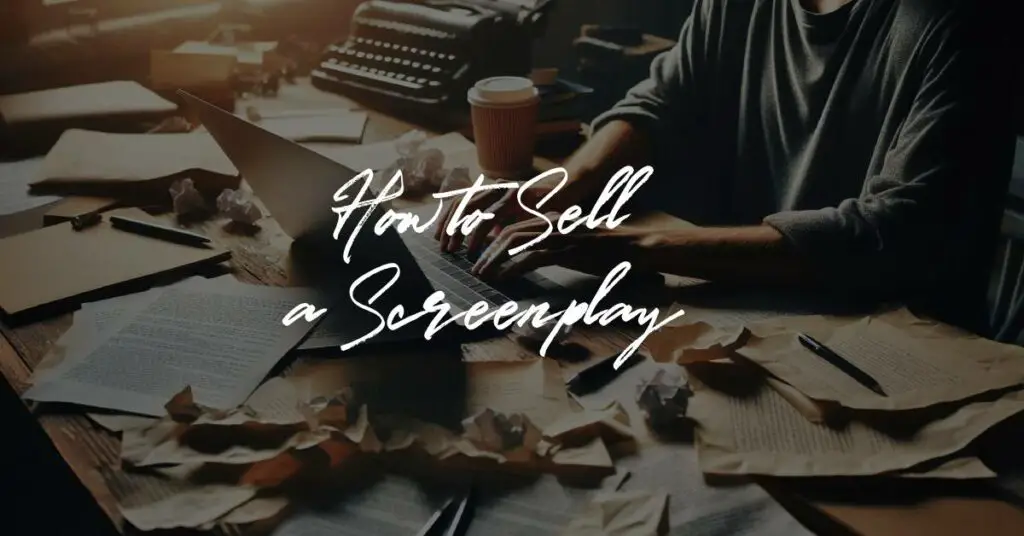Have you written a screenplay that you believe has what it takes to make it to the big screen? Emily Carmichael was once in your position.
After years of creating short films and writing scripts, she finally sold her first screenplay to Universal Pictures. The result? The blockbuster “Pacific Rim: Uprising.” But Emily’s story isn’t typical.
The harsh reality is that Hollywood studios produce around 300 movies annually from a pool of over 100,000 scripts. Those aren’t encouraging odds. However, with the right approach, determination, and realistic expectations, selling your screenplay is possible.
This comprehensive guide will walk you through actionable steps to sell your screenplay, whether you have industry connections or are starting completely from scratch. Let’s dive in.
Is Your Screenplay Really Ready?
Before attempting to sell your screenplay, you need to ensure it’s truly market-ready. Many first-time writers rush this crucial step.
Industry Standards for Script Formatting
Professional screenplay formatting is non-negotiable. Industry-standard formatting includes:
- 12-point Courier font
- Proper scene headings, action lines, and dialogue formatting
- 90-120 pages for feature films (drama/comedy typically 90-110, action/adventure 100-120)
- Correct margins and spacing
Screenwriting software like Final Draft, WriterDuet, or Fade In can automate these formatting requirements.
The Multiple Drafts Reality
Professional screenwriters typically write 10-20 drafts before considering their script market-ready. This iterative process includes:
- First draft – getting the story on paper
- Structure revisions – ensuring proper pacing and act breaks
- Character development refinements
- Dialogue polishing
- Scene-by-scene optimization
- Professional feedback incorporation
- Final polish
How to Know When Your Script is Market-Ready
Your screenplay is potentially market-ready when:
- You’ve received positive feedback from objective industry readers
- The story has a clear beginning, middle, and end with proper structure
- Characters have distinct voices and clear motivations
- Dialogue sounds natural and serves multiple purposes (character, plot, subtext)
- The script has been professionally proofread
- You can summarize the core concept in one compelling sentence
Common Rookie Mistakes
Avoid these tell-tale amateur errors:
- Excessive scene description and camera directions
- On-the-nose dialogue lacking subtext
- Character introductions that focus on physical appearance over character traits
- Passive protagonists who don’t drive the action
- Scenes that don’t advance the plot or reveal character
- Excessive use of flashbacks, voice-overs, or dream sequences
Creating Essential Marketing Materials
Before approaching industry professionals, develop these crucial marketing materials:
Crafting a Compelling Logline
A logline is a one-sentence summary of your screenplay that hooks the reader. It typically includes:
- The protagonist
- Their main goal
- The central conflict
- The stakes
Poor logline example: “A man tries to save people from a shark at a beach town.”
Strong logline example: “When a massive great white shark terrorizes a New England beach community, a reluctant sheriff must team up with a grizzled shark hunter and oceanographer to hunt the beast before tourism season collapses.”
Writing an Effective One-Page Synopsis
Your synopsis should:
- Introduce main characters
- Outline the complete story arc including the ending
- Highlight the most cinematic moments
- Demonstrate commercial potential
- Convey your unique voice
- Be visually scannable with short paragraphs
- Avoid excessive detail or subplots
Developing a Verbal Pitch
Practice a 30-second verbal pitch that captures:
- The hook
- The genre
- The protagonist’s journey
- What makes your story unique
- Comparable successful films (“It’s like X meets Y for the Z generation”)
Building a Writer’s Portfolio
Don’t put all your hopes on a single script. Develop:
- 2-3 completed screenplays in the same or related genres
- A few solid concepts with treatments
- Writing samples that showcase your versatility
- A professional-looking website or portfolio page
Understanding the Screenplay Market
To sell your screenplay, you need to understand how the industry actually works.
Spec Scripts vs. Commissioned Work
Spec Scripts: Written “on speculation” without payment, hoping to sell later.
- Advantages: creative freedom, potential for bigger payday
- Challenges: no guaranteed buyer, highly competitive market
Commissioned Work: Writing hired by studios or producers.
- Advantages: guaranteed payment, built-in production possibility
- Challenges: less creative control, requires established reputation
The Role of Industry Gatekeepers
- Secure writing opportunities and negotiate deals
- Take 10% commission
- Primarily focused on working writers, not beginners
- Regulated by WGA (Writers Guild of America)
Managers:
- Develop writers’ careers and provide career guidance
- Take 15-20% commission
- More likely to work with emerging writers
- Focus on long-term career building
Entertainment Lawyers:
- Review and negotiate contracts
- Charge hourly rates or percentage fees
- Can sometimes make introductions to producers
The Acquisition Process
Typical screenplay acquisition follows this path:
- Script submitted by agent/manager to development executives
- Coverage (internal script analysis) generated
- If positive, higher-level executives review
- Decision to option or purchase
- Development process begins (often with rewrites)
- Green light for production (rare without significant revisions)
Setting Realistic Expectations
The timeline from sale to production:
- Option period: 6-18 months (renewable)
- Development: 1-3 years
- Pre-production: 6-12 months
- Production: 2-6 months
- Post-production: 6-12 months
- Release: 3-6 months after completion
Many sold screenplays never make it to production.
What Makes a Screenplay Marketable
Understanding market demands increases your chances of selling your screenplay.
Budget Considerations
Micro-budget: Under $500,000
- Character-driven stories
- Limited locations
- Small cast
- Minimal special effects
- Examples: horror, relationship dramas, contained thrillers

Mid-budget: $5-30 million
- Increasingly rare in Hollywood
- Character-driven with commercial elements
- Targeted demographic appeal
- Examples: adult dramas, romantic comedies, smaller-scale thrillers
High-budget: $100 million+
- Tentpole features
- Franchise potential
- Global appeal
- Established IP (intellectual property)
- Examples: superhero films, action blockbusters
First-time writers have better odds with lower-budget concepts.
Current Genre Trends (2025)
While trends evolve, these genres currently show commercial potential:
- Elevated horror (psychological elements with social commentary)
- Character-driven sci-fi (high concept but emotionally grounded)
- Diverse perspectives in familiar genres
- Adaptation-friendly concepts
- Streaming-friendly limited location thrillers
The Power of “High Concept”
A high concept screenplay:
- Can be explained in one sentence
- Has a unique hook
- Appeals to a wide audience
- Has visual potential
- Offers a fresh take on a proven genre
Examples: “What if a dinosaur theme park actually opened?” (Jurassic Park) or “What if toys came alive when humans weren’t looking?” (Toy Story)
Paths to Selling Your Screenplay
There are multiple routes to selling your screenplay, each with advantages and challenges.
Finding Representation
When you need representation:
- Your screenplay is truly market-ready
- You have multiple strong scripts
- You’re targeting major studios or production companies
- You need contract negotiation expertise
How to query agents effectively:
- Research appropriate agents who represent writers in your genre
- Craft a personalized query letter (max 1 page)
- Include your logline, brief synopsis, and relevant background
- Follow submission guidelines exactly
- Be professional and patient
What agents look for:
- Commercial potential
- Unique voice
- Writing proficiency
- Long-term career potential
- Marketable concepts
Manager alternative: Managers often accept unsolicited queries and work with newer writers. They focus on developing your career rather than just making sales.
Direct Approaches to Producers
Researching compatible production companies:
- Identify companies producing similar content
- Focus on companies that make films at your script’s budget level
- Use IMDbPro, Variety Insight, or ProductionWeekly
- Check submission policies (many require agent submission)
Effective query letters:
- Personalize to the recipient’s previous work
- Start with a hook or connection
- Include a compelling logline
- Keep it under one page
- Mention any relevant accolades or experience
- End with a clear call to action
Online platforms and marketplaces:
- The Black List (paid evaluation service)
- InkTip (screenplay listing service)
- Stage 32 (networking and script marketplace)
- Coverfly (contest aggregator and talent discovery)
Contests, Fellowships, and Platforms
Top screenplay competitions:
- Nicholl Fellowships (Academy of Motion Picture Arts and Sciences)
- Austin Film Festival Screenplay Competition
- Sundance Screenwriters Lab
- Final Draft Big Break Contest
- ScreenCraft Film Fund
Major fellowships:
- HBO Access Writing Fellowship
- Universal Writers Program
- CBS Writers Mentoring Program
- Warner Bros. Television Writers’ Workshop
- Nickelodeon Writing Program
Leveraging placement:
- Include achievements in query letters
- Use feedback to improve your script
- Network with judges and other finalists
- Submit improved script to industry platforms
Networking Strategies That Actually Work
Building industry connections is crucial for screenplay sales.
Building Industry Connections from Scratch
Worthwhile film festivals:
- Sundance Film Festival
- Austin Film Festival (strongest for screenwriters)
- Tribeca Film Festival
- Toronto International Film Festival
- Local film festivals (more accessible networking)
Industry events and pitchfests:
- Great American Pitchfest
- ScriptFest
- Hollywood Pitch Festival
- Story Expo
- WGA-sponsored events

Effective social media strategies:
- Twitter (#screenwriting community)
- LinkedIn (connect with industry professionals)
- Facebook screenwriting groups
- Reddit r/Screenwriting
- Discord screenwriting communities
Collaboration opportunities:
- Film school student productions
- Local independent films
- Web series production
- Table reads and screenwriting groups
- Alumni networks
Location Considerations
Los Angeles vs. Everywhere Else:
LA advantages:
- Physical proximity to decision-makers
- Casual networking opportunities
- Industry events and mixers
- Writers’ rooms and development meetings
- Face-to-face pitch opportunities
Remote working advantages:
- Lower cost of living
- Distinctive perspective outside the “Hollywood bubble”
- Growing acceptance of remote work
- Digital networking capabilities
- Focus on writing without distractions
Building regional film connections:
- Local film offices and commissions
- Regional film festivals
- University film programs
- Independent producer groups
- Location-specific production incentives
The Deal Process
Understanding deal structures is essential when selling your screenplay.
Options vs. Sales
Screenplay options explained:
- Limited-time exclusive rights to purchase your screenplay
- Typically 6-18 months (renewable)
- Option fees: $500-$10,000 for first-time writers
- Applied against purchase price if exercised
Option terms for first-time writers:
- Purchase price: 2-3% of production budget (typically $50,000-$150,000)
- Credit position and type
- Rewrite provisions
- Profit participation (rare for first-time writers)
- Rights reversion conditions
During the option period:
- Development work may begin
- Director/cast attachments pursued
- Financing assembled
- Possible rewrites requested
Option to purchase conversion:
- Full rights transfer upon exercise
- Payment of remainder of purchase price
- Contract execution for production
- Schedule determination
Protecting Yourself Legally
Copyright essentials:
- Register with U.S. Copyright Office ($45-$65)
- WGA registration ($20 members, $40 non-members)
- Documented development materials
- Dated electronic submission records
When to hire an entertainment attorney:
- Before signing any option agreement
- When negotiating purchase terms
- If representation is unclear about terms
- For any contract amendments
- Typical cost: Hourly ($350-$600) or percentage (5-10%)
Red flags in agreements:
- Perpetual options
- Rights without compensation
- Vague credit terms
- Life rights grabs
- Excessive rewrites without compensation
- No reversion clauses
Alternative Paths to Getting Produced
Sometimes the most effective route is creating your own opportunities.
Producing Your Own Screenplay
Micro-budget filmmaking:
- Typical budget: $10,000-$250,000
- Focus on character-driven stories
- Limited locations (1-3 primary settings)
- Small cast (under 10 speaking roles)
- Natural lighting and practical effects
- Existing wardrobe and locations
Crowdfunding strategies:
- Kickstarter, Indiegogo, Seed&Spark
- Compelling video pitch
- Strategic reward tiers
- Community building before launching
- Transparent budget allocation
- Regular updates and engagement
Film grants and funding opportunities:
- Tribeca Film Institute grants
- Sundance Institute Feature Film Program
- Film Independent grants
- State film commission incentives
- Sloan Foundation (science-themed projects)
Festival strategy for self-produced films:
- Start with niche and regional festivals
- Target category-specific festivals
- Build momentum before major submissions
- Budget for festival application fees ($40-$100 each)
- Plan for attendance and networking
Adaptation and Collaboration Routes
Proof-of-concept shorts:
- 5-15 minute standalone films
- Showcase the tone and visual style
- Demonstrate directorial capability
- Focus on a compelling scene
- Use for online portfolio and festival submissions
Partnering with directors/producers:
- Film school graduate connections
- Early-career directors seeking material
- Established directors between projects
- Mutual development partnerships
- Shared creative control and financing responsibility
Digital content stepping stones:
- YouTube series pilots
- Streaming platform short-form content
- Podcast audio dramas
- Interactive narrative experiences
- Social media episodic storytelling
Building a Sustainable Screenwriting Career
Selling a screenplay is just the beginning of a sustainable writing career.
Multiple Projects and Persistence
Successful screenwriters maintain:
- 2-3 market-ready screenplays
- 3-5 developed concepts with treatments
- 1-2 projects in active writing phase
- Multiple genre capabilities (with focus areas)
- Continuous skill development
Success Metrics Beyond Sales
Measure progress through:
- Quality and consistency of feedback
- Network development
- Representation interest
- Competition advancement
- Meeting opportunities
- Option offers (even low-paying ones)
- Writing skill improvement
Professional Development
Continue growing through:
- Advanced screenwriting workshops
- Mentorship relationships
- Script consultation services
- Industry conferences
- Writers’ room shadowing (when available)
- Adaptation skills development
Final Thoughts
Selling a screenplay requires persistence, continuous improvement, and strategic networking. While the statistics may seem daunting, remember that every produced screenplay was once just an idea in a writer’s mind.
Focus on writing exceptional material, understanding the business side of the industry, and building genuine relationships. With determination and strategic effort, you can navigate the challenging path from completed screenplay to successful sale.
Most importantly, keep writing. Your next screenplay might be the one that launches your career.
Resources for Screenwriters
Recommended Books:
- “The Screenwriter’s Bible” by David Trottier
- “Save the Cat” by Blake Snyder
- “The Hollywood Standard” by Christopher Riley
- “The Writer’s Journey” by Christopher Vogler
- “Writing Movies for Fun and Profit” by Thomas Lennon and Robert Ben Garant
Industry Directories:
- IMDbPro
- Variety Insight
- ProductionWeekly
- Studio System
- The Hollywood Creative Directory
Screenwriting Tools:
- Final Draft
- WriterDuet
- Highland 2
- Fade In
- ScriptHop
Online Communities:
- Reddit r/Screenwriting
- Stage 32
- Screenwriting Masterclass (Facebook Group)
- Twitter #screenwriting community
- Done Deal Pro forums
